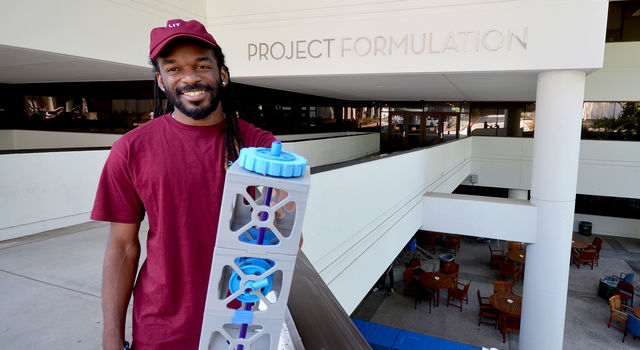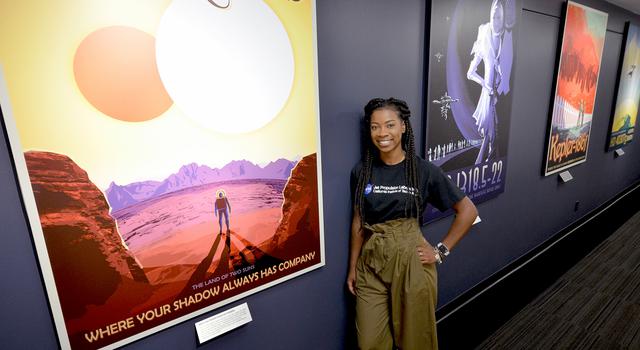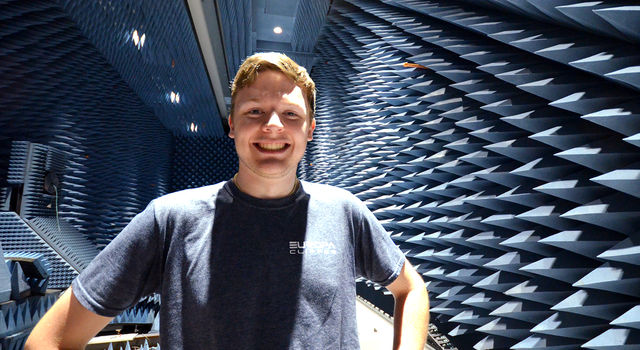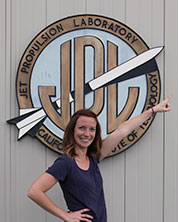Meet JPL Interns| July 24, 2018
Preparing to See the Unseen on Jupiter's Moon Europa
A radar on NASA’s Europa Clipper spacecraft will be key to finding out if Jupiter's moon Europa is indeed an ocean world, so JPL intern Zachary Luppen is creating ways to test it to perfection. We caught up with Luppen, an astronomy and physics major from the University of Iowa, to find out how he’s helping the team peer below the icy moon’s surface and to hear about his recent brushes with space stardom.
What are you working on at JPL?
I'm working on the integration, testing and automation of the REASON instrument for the Europa Clipper mission. REASON is a radar instrument that will look within the icy crust of Jupiter’s moon Europa to look for water pockets, characterize the moon’s surface and see if we can confirm that there’s an ocean below its surface.
How does the radar work and why is it important for the mission?
The radar performs what’s called interferometry by sending out and receiving signals that create measurable interference patterns. Based on what signal bounces back, we can figure out the composition of the crust.
The radar probably first and foremost is trying to answer whether the moon has an ocean, and will probably help with determining a landing site for a potential future lander. So the Europa Clipper orbiter is sort of this preliminary study for eventually putting something on the surface. The REASON instrument is going to study a large portion of the moon’s surface and look for a landing spot, possibly where the ice is thinnest so we will not have to drill too deep to find water.
Why is NASA especially interested in Europa as a destination to explore?
Europa is a very interesting moon because it's way out at Jupiter, so it's far away from the Sun, and yet, scientists have data to support the notion that it might have liquid water. What allows it to have this water below its icy crust and how deep is that water? How thick is the icy crust? And if we were to drill into the crust, is there the potential to find life below it? Europa very quickly becomes a moon that can transform society on Earth, if we happened to find extraterrestrial life there.
What’s an average day like for you?
A lot of the work that I do involves programming in a language called Python. The transmitter boards, which are used to generate the signals that would propagate downwards toward Europa, are currently being built at the University of Iowa, and once we get them here at JPL, we're going to have to test them nonstop, see how we can break them, see how we can improve them. Whatever we need to do to make sure we operate perfectly during the mission. A lot of my work involves writing the software that's going to be doing this testing. Other than that, I've been writing programs called GUIs, graphical user interfaces, to interact with the instruments without having to actually touch them. So if you’re not able to go into the cleanroom during testing, then you can just use your computer to type commands.
How did you get involved in the project?
I’m a student at the University of Iowa and our team has been working on the transmitter boards for the past couple of years. I was dying to get involved in spacecraft and by the end of my sophomore year, I finally had the opportunity to do so because I got a grant from the university to pay for research. I started off simply cleaning rooms and putting away parts, which was pretty menial, however, I did learn what the parts were and how to quickly blow them up if you don't use them properly. Then I worked my way up to kitting parts, which is organizing them for our soldering technician. This doesn't sound like a rigorous job, but it's the first task that needs to be done to make a circuit board, and if it's not done properly, nothing else matters because the circuit boards won’t work. So I just kept working on that throughout my junior year and now I'm out here interning.
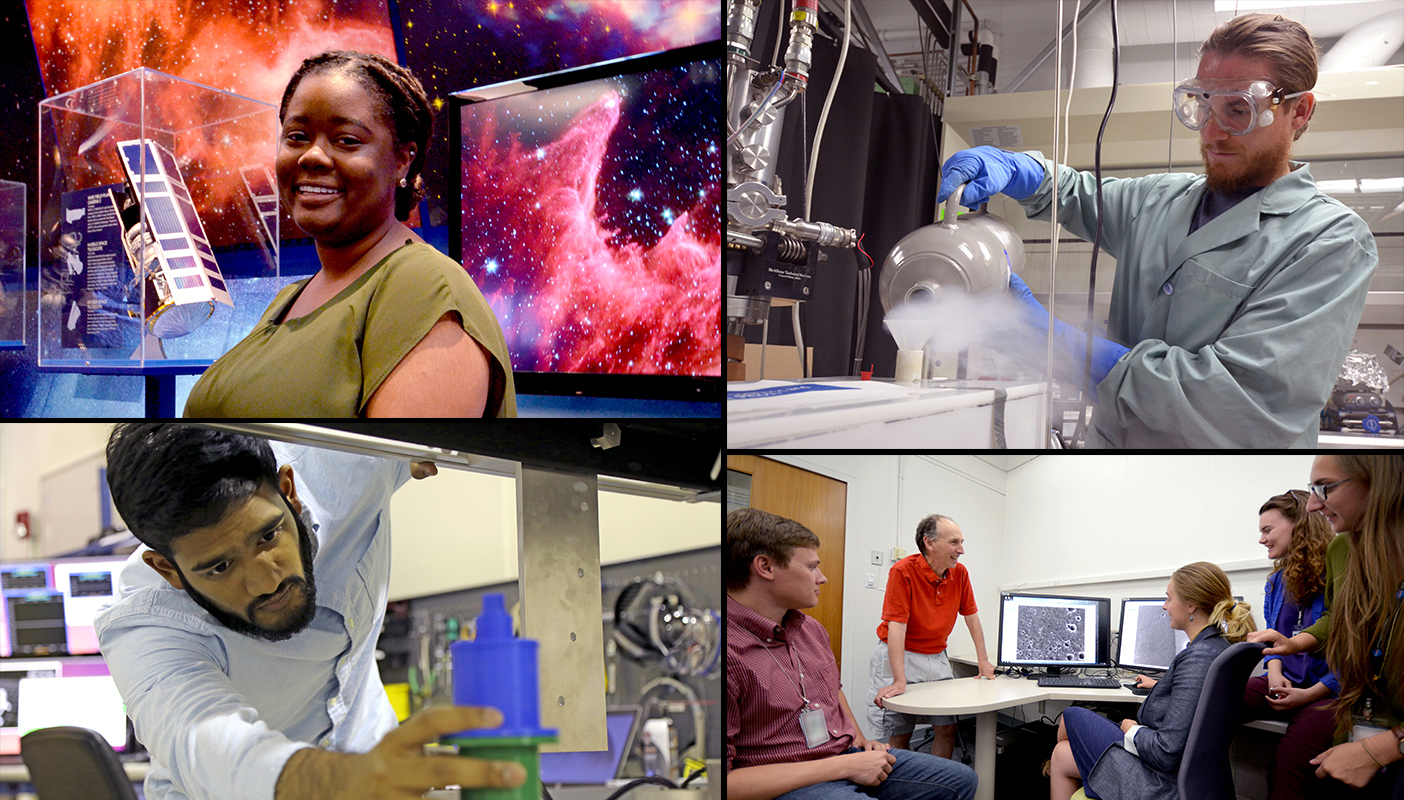
Meet JPL Interns
Read stories from interns pushing the boundaries of space exploration and science at the leading center for robotic exploration of the solar system.
Your question was chosen to be broadcast as part of a downlink for NASA interns with astronauts on the International Space Station. What does it mean to know that your question is going to space?
Words that I spoke are going to be shown to astronauts. Pixels showing me and audio from my mouth will be appearing on the International Space Station, so I'm almost riding on the station. In a sense, my dream of going to space is another step toward coming true
Have you had any other JPL or NASA unique experience of note?
I got to meet astronaut Kate Rubins when she visited JPL recently. That was the first time that I'd ever met an astronaut. And I was just like, oh my gosh, I was shaking. Someone told me I could go up and shake her hand and I was like, really, I'm allowed to do that?! And I did. And then I got her autograph afterward.
How do you feel you're contributing to NASA/JPL missions and science?
The programming work I’m doing is contributing directly to the testing phase of the Europa mission, which is cool in itself. But also just trying to make as many people aware as possible that the science is going on, that it's worth doing and worth finding out, especially if we were to find life on Europa. That changes humanity forever!
If you could travel to any place in space, where would you go and what would you do there?
Oh my god. The planetary system around the star TRAPPIST-1 is fascinating. The ISS is fascinating. Mars is Mars. Europa is Europa. This is a hard question. I guess, in order to further science, I’d go to Europa. If I could just go to Europa and see if there's life, well then, we’d answer one of the biggest questions ever asked.
Explore JPL’s summer and year-round internship programs and apply at: https://www.jpl.nasa.gov/edu/intern
The laboratory’s STEM internship and fellowship programs are managed by the JPL Education Office. Extending the NASA Office of Education’s reach, JPL Education seeks to create the next generation of scientists, engineers, technologists and space explorers by supporting educators and bringing the excitement of NASA missions and science to learners of all ages.
TAGS: Interns, Internships, Higher Education, College, Opportunities, STEM, engineering, Europa Clipper, Europa, Ocean Worlds





